Developmental assessments are a crucial part of understanding children’s growth and progress across various domains.
What are Developmental Assessments?
Think of developmental assessments as comprehensive snapshots, capturing a child’s skills and abilities across key domains like:
- Physical development: Gross motor skills (running, jumping), fine motor skills (grasping, drawing), vision, hearing.
- Cognitive development: Problem-solving, memory, language, learning, reasoning.
- Social-emotional development: Communication, self-awareness, emotional regulation, relationships.
These assessments employ standardized tools and observations to compare a child’s performance to typical developmental milestones for their age. The goal is not to categorize or label, but to identify potential areas of strength or concern that can inform effective support strategies.
Why are Developmental Assessments Important?
Early identification of developmental delays can lead to timely interventions, minimizing potential challenges and maximizing a child’s potential. Assessments facilitate a collaborative approach, involving healthcare professionals, educators, and families, to tailor individual support plans.
Who Conducts Developmental Assessments?
A range of qualified professionals can perform assessments, depending on the context and specific needs. These include:
- Pediatricians and nurses: During routine checkups, they monitor development and conduct initial screenings.
- Developmental specialists: Psychologists, occupational therapists, speech-language pathologists, and other specialists offer in-depth evaluations when concerns arise.
- Early childhood educators: Teachers and childcare providers can observe and document children’s development within their educational settings.
Types of Developmental Assessments:
- Screening: Brief questionnaires or checklists to identify potential delays requiring further evaluation.
- Diagnostic: In-depth assessments to determine the presence and nature of specific developmental challenges.
- Progress monitoring: Tracking improvements over time to evaluate the effectiveness of interventions.
Understanding the Results:
Assessment results are typically presented as a standardized score or developmental age, often alongside qualitative observations. It’s crucial to interpret these results objectively within the context of a child’s individual differences and unique experiences.





Leave A Comment